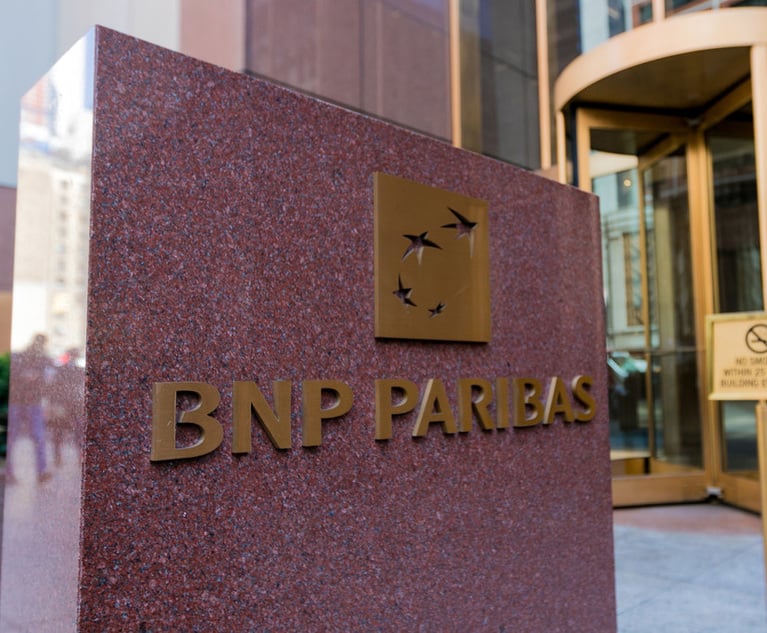Crypto Not So Cryptic: Southern District Applies Traditional Securities Law Analysis to Digital Currency
Although the 'Owen' decision is detailed and carefully reasoned, it is perhaps most notable for its relative straightforwardness. For all that hype that technologies like blockchain get as "disruptors" requiring new legal paradigms, sometimes the existing legal regime works just as well.
January 14, 2022 at 12:00 PM
12 minute read
 It is a common complaint, from inventors and lawyers alike, that the law tends to have trouble keeping up with new technologies, especially when they become widespread and assimilated in unexpected ways. It is certainly true that applying decades old statutes in new contexts can present substantial challenges. But sometimes, once the tech trappings are stripped away from the latest shiny new thing, courts find a familiar structure underneath and the applicable law becomes more clear.
It is a common complaint, from inventors and lawyers alike, that the law tends to have trouble keeping up with new technologies, especially when they become widespread and assimilated in unexpected ways. It is certainly true that applying decades old statutes in new contexts can present substantial challenges. But sometimes, once the tech trappings are stripped away from the latest shiny new thing, courts find a familiar structure underneath and the applicable law becomes more clear.
An example of this arose recently in the world of crypto. The term "crypto" refers to a class of digital assets (including cryptocurrencies and non-fungible tokens or NFTs) backed by an unalterable digital ledger called a "blockchain". No single person or entity controls the blockchain—it is "distributed" among multiple servers—and every transaction in the associated asset is recorded on it. It is functionally impossible to alter, delete, or destroy records once they are entered on the blockchain. In theory, this system permits the creation of a digital asset that can be tied to an "owner" (who may remain anonymous) and never counterfeited. A "cryptocurrency" (such as Bitcoin) is a digital asset backed by a blockchain, intended for use as an investment or to purchase goods and services. (Other systems, such as NFTs, attempt to use blockchain technology to guarantee "uniqueness" of a digital object or backstop intellectual property or contractual rights.)
At first glance, cryptocurrency would seem to present many of the classic difficulties faced by courts assessing new technologies. It is generally a purely non-tangible asset, often developed by companies or individuals with limited presence in the United States. Many cryptocurrencies are designed to be untraceable or anonymous, and transactions in them are, by definition, highly distributed—spread out over computers and servers around the world. Courts must therefore ask some basic questions: where are cryptocurrencies "located?" Where do transactions involving them take place, and where can they be regulated? These new assets also present definitional questions: what is cryptocurrency and which legacy statutes apply to it? Is it a currency? A commodity? A security? What form of regulation is most applicable to this new construct?
This content has been archived. It is available through our partners, LexisNexis® and Bloomberg Law.
To view this content, please continue to their sites.
Not a Lexis Subscriber?
Subscribe Now
Not a Bloomberg Law Subscriber?
Subscribe Now
NOT FOR REPRINT
© 2025 ALM Global, LLC, All Rights Reserved. Request academic re-use from www.copyright.com. All other uses, submit a request to [email protected]. For more information visit Asset & Logo Licensing.
You Might Like
View All

'Merciless' Filing Deadline Dooms Cuban Americans' Property-Trafficking Suit Against BNP Paribas, SocGen
4 minute read
After 2024's Regulatory Tsunami, Financial Services Firms Hope Storm Clouds Break

Trending Stories
- 1Federal Judge Pauses Trump Funding Freeze as Democratic AGs Launch Defensive Measure
- 2Class Action Litigator Tapped to Lead Shook, Hardy & Bacon's Houston Office
- 3Arizona Supreme Court Presses Pause on KPMG's Bid to Deliver Legal Services
- 4Bill Would Consolidate Antitrust Enforcement Under DOJ
- 5Cornell Tech Expands Law, Technology and Entrepreneurship Masters of Law Program to Part Time Format
Who Got The Work
J. Brugh Lower of Gibbons has entered an appearance for industrial equipment supplier Devco Corporation in a pending trademark infringement lawsuit. The suit, accusing the defendant of selling knock-off Graco products, was filed Dec. 18 in New Jersey District Court by Rivkin Radler on behalf of Graco Inc. and Graco Minnesota. The case, assigned to U.S. District Judge Zahid N. Quraishi, is 3:24-cv-11294, Graco Inc. et al v. Devco Corporation.
Who Got The Work
Rebecca Maller-Stein and Kent A. Yalowitz of Arnold & Porter Kaye Scholer have entered their appearances for Hanaco Venture Capital and its executives, Lior Prosor and David Frankel, in a pending securities lawsuit. The action, filed on Dec. 24 in New York Southern District Court by Zell, Aron & Co. on behalf of Goldeneye Advisors, accuses the defendants of negligently and fraudulently managing the plaintiff's $1 million investment. The case, assigned to U.S. District Judge Vernon S. Broderick, is 1:24-cv-09918, Goldeneye Advisors, LLC v. Hanaco Venture Capital, Ltd. et al.
Who Got The Work
Attorneys from A&O Shearman has stepped in as defense counsel for Toronto-Dominion Bank and other defendants in a pending securities class action. The suit, filed Dec. 11 in New York Southern District Court by Bleichmar Fonti & Auld, accuses the defendants of concealing the bank's 'pervasive' deficiencies in regards to its compliance with the Bank Secrecy Act and the quality of its anti-money laundering controls. The case, assigned to U.S. District Judge Arun Subramanian, is 1:24-cv-09445, Gonzalez v. The Toronto-Dominion Bank et al.
Who Got The Work
Crown Castle International, a Pennsylvania company providing shared communications infrastructure, has turned to Luke D. Wolf of Gordon Rees Scully Mansukhani to fend off a pending breach-of-contract lawsuit. The court action, filed Nov. 25 in Michigan Eastern District Court by Hooper Hathaway PC on behalf of The Town Residences LLC, accuses Crown Castle of failing to transfer approximately $30,000 in utility payments from T-Mobile in breach of a roof-top lease and assignment agreement. The case, assigned to U.S. District Judge Susan K. Declercq, is 2:24-cv-13131, The Town Residences LLC v. T-Mobile US, Inc. et al.
Who Got The Work
Wilfred P. Coronato and Daniel M. Schwartz of McCarter & English have stepped in as defense counsel to Electrolux Home Products Inc. in a pending product liability lawsuit. The court action, filed Nov. 26 in New York Eastern District Court by Poulos Lopiccolo PC and Nagel Rice LLP on behalf of David Stern, alleges that the defendant's refrigerators’ drawers and shelving repeatedly break and fall apart within months after purchase. The case, assigned to U.S. District Judge Joan M. Azrack, is 2:24-cv-08204, Stern v. Electrolux Home Products, Inc.
Featured Firms
Law Offices of Gary Martin Hays & Associates, P.C.
(470) 294-1674
Law Offices of Mark E. Salomone
(857) 444-6468
Smith & Hassler
(713) 739-1250






